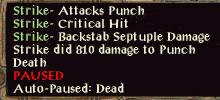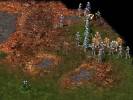Chapter 10: Powergaming vs. Roleplaying
There is, in a sense, a continuum of gameplay attitudes, and all RPG players fall somewhere along its line.
All players are going to find themselves somewhere between these two endpoints, in terms of how much they care about storytelling and believable gameplay, vs. how much they care about steamrolling through the game. (It's possible to care quite a lot about both, but in most cases players find themselves favoring one side over the other.) Roleplayers deride powergamers for being "munchkin" and/or "cheesy," while powergamers mock roleplayers for being "stupid." Some examples of roleplaying "stupidity" include the "Snow White" party, in which the main character was a Female Bard who was not allowed to perform any action except sing her Bard Song and carry stuff—the real work was done by the other 5 party members, all of whom were Dwarves, Gnomes, or Halflings. There is also the tale of "The Reluctant Protagonist," in which the main character was a total coward: The player set his AI script to flee in terror whenever he saw an enemy. Most "stupid" of all, at least from a powergamer's point of view, the roleplayers who run these games frequently write up in-character reports of how their game is progressing, and post the installments on their favorite forum(s).
As for being "munchkin" and "cheesy," first I must define those terms. Munchkin is being visibly fixated on power and personal gain; this manifests most often in rolling one's stats (particularly when you "min-max" them, selecting one stat that you won't need and dropping it down to the absolute minimum, thus freeing up those points to drive those stats that you do want to their absolute effective maxima) and in use of metagaming knowledge; e.g., taking the party on a long
| journey to an obscure location that your character has no reason to go to yet, simply because you know there's an enemy there who drops this great Shield. Cheese, on the other hand, is not (necessarily) about power, but rather about your knowledge of the fact that you're playing a computer game: When you are aware of some possible flaw or unrealistic detail in the way that the game is implemented, and you choose to take advantage of it, that is cheese. The most infamous example of cheese is the Fake-Talk "strategy:" Stand far away from some neutral creature, and click on them to talk to them. They will turn toward you, and wait for you to walk right up to them so the conversation can take place. Before you reach them, |  |
Two terms closely related to "munchkin" are overpowered and über, which are synonymous and mostly used in the discussion of mods, to describe items, spells, or creatures that are noticably more powerful than comparable items, spells, and creatures from the default game. But some aspects of vanilla BG, especially BG2, are commonly judged to be overpowered as well, because at certain points of the game, your success or failure can depend not on your party's levels or preparedness, your own skill, or even the roll of the dice, but rather on whether or not you're using that particular item/spell/creature. The terms overpowered and über can be applied to all aspects of the game (frequently, the only safe way to defeat overpowered enemies is by using overpowered items, starting an "arms race" that quickly leaves most of the vanilla game in the dust), while munchkin is usually used to describe only the PC and his party.
The object of this chapter is not to influence you either for or against powergaming or roleplaying, nor to encourage or discourage the use of cheesy or munchkin practices—this chapter is intended merely to inform you of what the game will and won't let you do, especially if that might seem unrealistic. The goal is to present you with a range of options, to help you choose for yourself what your own personal playing style will be. I will at times state my own opinions on certain matters, but remember that that's all they are; opinions.
Character Creation: Choosing your Class/Kit.
Hardcore Powergaming Method: Plan ahead and juggle your possible options for party members, choosing the most skilled and useful NPCs available, and build your main character in any of the stronger classes/kits that will best augment the strengths, and cover any possible weaknesses, of the party, so that all bases are covered as thoroughly as possible. If you are Dual-classing, work out precisely when you will Dual before you even begin the game, in order to get the maximum benefit from the Dual, and so that you can prepare ahead of time to have backup party members cover for you while your first class's skills are unavailable to you.
Hardcore Roleplaying Method: Choose whatever class, kit, or class combination whose ethos sounds like a fun character to play, even if it's a kit as badly implemented as the Beast Master, and just roll with it, recruiting party members as you bump into them. If you are Dual-Classing, perform the Dual at some crisis point in your character's emotional outlook: e.g., if you encounter a quest in the game where a high-ranking Priest of the same god that your PC worships is revealed to be a false Cleric (in actuality offering secret prayers to an entirely different deity), that might be a good roleplaying moment for your PC Cleric to suddenly lose faith and Dual-class, regardless of what EXP level he might be at the time.
Middle Ground: Unless you're running a Solo game, putting together a well-balanced party is often critically important, so recruiting your desired NPCs quickly, and Dual-Classing at an appropriate level, both fall under the heading of simple "good tactics." But for roleplaying considerations, you might try to avoid visiting areas, even areas where your desired party members can be found, until your party has a valid in-game reason (with a relatively high priority) to go there. Also, consider rushing/delaying important plot events that might influence your Dual-Classing, so that they occur when your character is at a good level to start the Dual anyway.
Character Creation: Rolling Your Stats.
 |
Hardcore Powergaming Method: Keep hitting Reroll and examining the numbers, frequently adding them up and Saving the result when you get a stat total that exceeds the previous "high score." Once
you have a total that is very high (usually above 90), pour those points into the stats that matter the most to how you intend to use the character, raising each stat all the way up to its effective maximum. The stats that you don't intend to use much (your
"dump stats") can share however many stat points happen to be left over. Hardcore Roleplaying Method: Whatever numbers come up the very first time, those are your stats. No Rerolls or moving points from one stat into another, at all. Middle Ground: There are dozens, if not hundreds, of variations on this. You could limit the number of times you allow yourself to Reroll, and then min-max the best set of numbers you get from that, or you could Reroll as much as you want, but penalize yourself for min-maxing: For every point you add to a stat that's already 15 or higher, you have to subtract two points from somewhere else. Etc. My own method is to allow |
Gameplay Situation: Party members are almost the only characters who can open & close doors.
What a Powergamer might do: In most situations, this is a non-issue. But if you find yourself losing a fight, it is often possible to run into another room and shut the door behind you. Even if the bad guy was right on your heels and you slammed the door right in his face, he will have no idea what just happened and will just stand at the door like an idiot, while you are free to heal yourself, re-evaluate your tactics, wait for his buffing spells to run out, and even Rest, because he can't figure out what a doorknob is.
What a Roleplayer might do: Knowing the limitations of the game's AI, a roleplayer might decide to never close a door on an enemy, unless that enemy is known to be extremely stupid (e.g., Golems), or they leave a bladed weapon near the door, under the roleplay that they wedged the door shut (applicable only on doors that swing open toward the party member).
Middle Ground: Holding a door shut makes sense as long as you remain directly in front of the door, keeping it shut by force, and not using it to stop enemies whose Strength score is much higher than your own (or high enough to be able to simply break the door down).
Gameplay Situation: Party members are almost the only creatures who can move from one area to another.
What a Powergamer might do: Take advantage of it! If you're fighting a spellcaster, allow him to begin casting his spell, and then leave the area before he can complete it, thus wasting his spell(s). If you're being chased by Warriors, simply step out the door and most of them will fail to follow, so you can divide their forces and destroy them piece by piece. (In BG1, they can't follow you between areas at all.)
What a Roleplayer might do: Give the game's AI the benefit of the doubt, and stand & fight until the battle is won (or lost), always keeping at least 1 party member in the area with the enemy.
Middle Ground: Do whatever you want, as long as you refrain from repeatedly ducking in & out of the enemy Mage's sight, thus forcing him to waste all of his high-level spellslots for no reason.
Gameplay Situation: For speed & efficiency reasons, the BG2 engine tends to run the AI scripts of ONLY those creatures that are within the sight







 Back to
Back to
